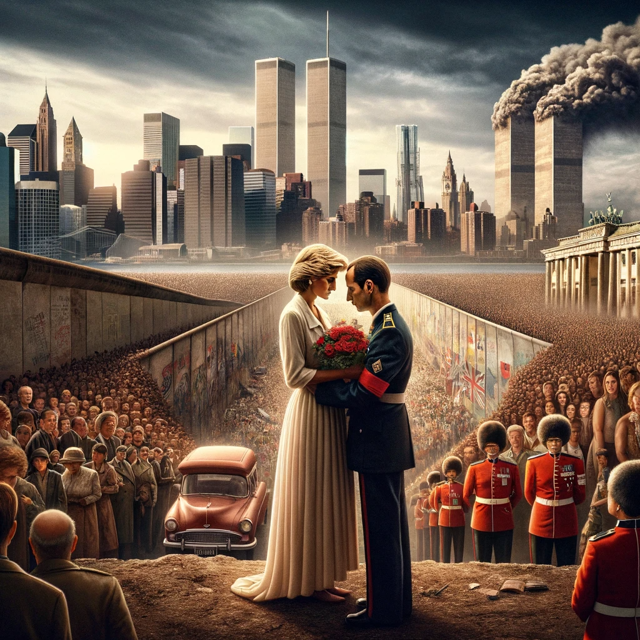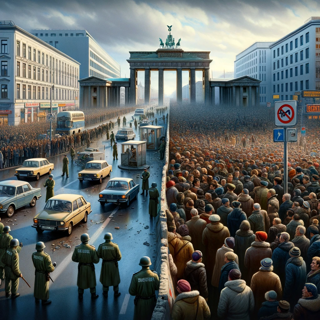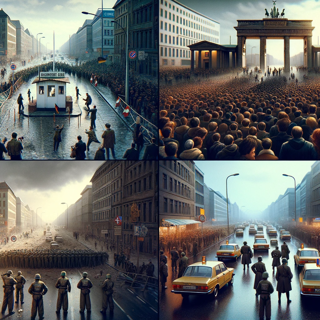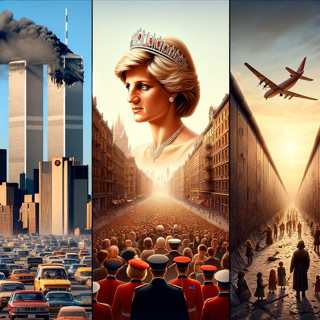January 2024
Step into the pages of history with this article and witness the profound personal and global impacts of three historic events: the 9/11 attacks, Princess Diana's death, and the fall of the Berlin Wall. Each moment is vividly recalled, intertwined with personal anecdotes and global implications, offering a unique perspective on events that reshaped the world. From the personal recollections of a world watching in shock, to the unfolding of a new era post-Berlin Wall, this narrative is a compelling blend of history, emotion, and transformation. Dive into a journey that not only revisits these pivotal moments but also explores their lasting effects on societies and individuals alike, reminding us how history is felt on both grand and intimate scales.
Last updated 24 months ago
Breaking Barriers: Echoes of the Berlin Wall's Fall
By Monica Granlove

There are pivotal moments in history etched in memory, where I recall my exact location. In my office, a colleague entered, bearing the weighty news that a plane had struck the World Trade Center. I stepped out of my office to find my team huddled around a computer, witnessing the tragic spectacle of people leaping from burning buildings. Another vivid recollection is waking up in a North Carolina hotel room to the news of Princess Diana's untimely death.
Witnessing the fall of the Berlin Wall was no exception when it comes to recollecting the specifics of my whereabouts. In my apartment, before the glow of the television, my mother's call conveyed a mix of joy and caution. "Uncle Rolf is happy to see that wretched wall come down, but there's going to be a lot of change in Germany soon.", she said.
The opening of the Berlin Wall was a result of political changes and protests that had been escalating throughout Eastern Europe, leading to the eventual collapse of communist regimes. Egon Krenz was a new leader who was faced with intense pressure from the citizens of East Germany to reduce or remove mobility restrictions and East Germany was in serious debt. On November 9, 1989, the East German government, facing mounting pressure, announced new travel regulations that allowed East Germans to visit West Germany.

The plan was not well thought out and a miscommunication occurred. Günter Schabowski, the spokesman for the ruling Socialist Unity Party (SED), made statements during the press conference which were vague and lacked precision. He mentioned that East Germans would be allowed to apply for permission to travel to West Germany. When questioned by reporters about when the new travel regulations would be implemented, Schabowski seemed unsure and improvised. In response to a question, he stated that the regulations would take effect "immediately, without delay."
The announcement that the travel regulations would take effect immediately led to spontaneous and widespread reactions among East Germans who were watching the press conference on television. Many interpreted the statement to mean that they could cross into West Germany right away.
Fueled by the misunderstanding, large crowds gathered at various border crossings, including the iconic Checkpoint Charlie and the Brandenburg Gate in Berlin. The border guards, unprepared for the situation, faced pressure from the growing number of people seeking to cross into West Berlin. Under mounting pressure, and lacking clear instructions, the border guards eventually decided to open the checkpoints. This unprecedented move allowed East Germans to cross freely into West Berlin and West Germany.
Uncle Rolf, a real character in the novel The Electrician and The Seamstress, didn’t really talk too much about the wall coming down other than to talk about the high unemployment rate and the stress on the economy as West Germany absorbed East Germany with all the infrastructure issues, shortages, debt, and much more. I wonder if he didn’t go into more detail because he had to leave his girlfriend there in 1961 when the wall went up. To find out more about his journey, read the articles “Bruno’s Son Goes East.”
The years following the fall of the Berlin Wall and the reunification of Germany in 1990 were marked by significant political, economic, and social changes. On October 3, 1990, Germany officially reunified, and the German Democratic Republic (East Germany) joined the Federal Republic of Germany (West Germany) to form a single, unified country. This marked the end of the Cold War division of Germany and the beginning of a new era.
The integration of East and West Germany presented substantial economic challenges. The economic systems of the two Germanys were vastly different, and the process of privatization and transitioning the East German economy to a market-oriented system was complex. Unemployment rates surged, and there were significant disparities in living standards between the two regions. Efforts were made to bridge the economic gap through substantial investments in infrastructure, education, and industry in the former East Germany. The German government initiated various programs to stimulate economic development and create employment opportunities.

The process of social and cultural integration between East and West Germans was a gradual one. People from both regions had to adapt to new political, economic, and social realities. Differences in lifestyles, education, and political perspectives sometimes led to a sense of division, commonly referred to as the "Wall in the Head."
Germany's reunification had implications for the broader European context. It solidified Germany's role as a unified and influential actor in European politics. The process was closely monitored by neighboring countries and European partners.
The years following reunification were a complex period of adjustment and transformation for Germany, with successes and challenges shaping the country's trajectory into the 21st century.

